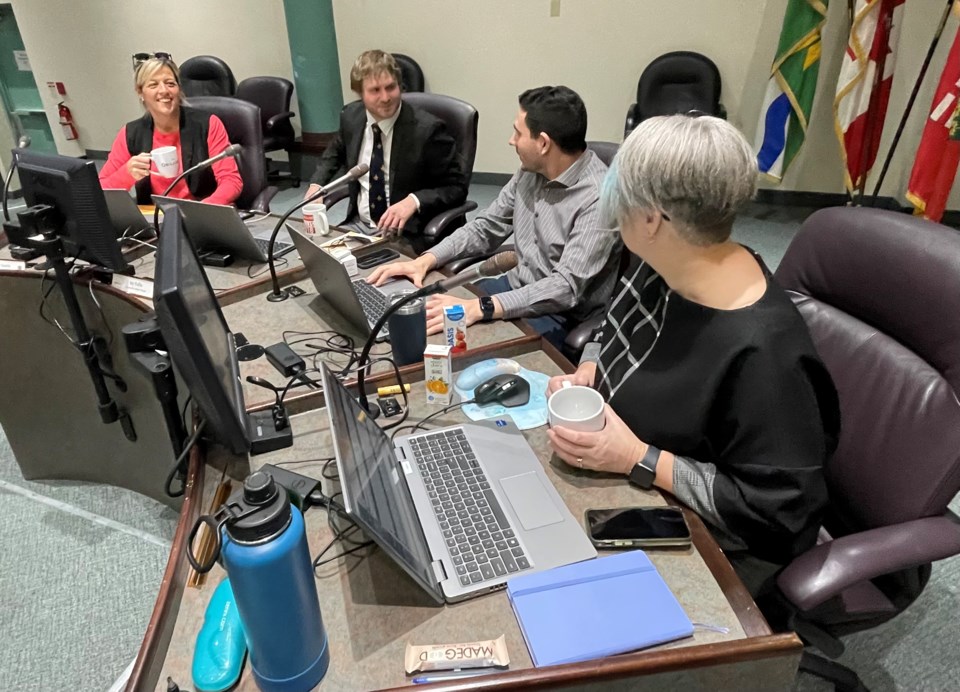Orillia city council will be meeting less than it did in the past, following policy changes that will reduce its number of meetings each year.
On average, council met 55 times per year through the 2018-22 term, or just over once per week. Under the new guidelines, set to come into effect in January, council will meet 35 times, or less, per year moving forward.
The changes come as the result of a comprehensive review of the city’s procedure bylaws, the first since 2012, with the goal of ensuring “a more efficient meeting process, (enabling) greater flexibility, and (enhancing) accountability and transparency,” according to a staff report.
As part of the changes, committee meetings will be held on the same day as council meetings, on the second and fourth Mondays of each month.
Decisions made at committee meetings will concurrently be ratified at council meetings on the same day, barring requests by council members to defer ratification of specific items to a later council meeting.
The changes were approved at last week’s council meeting, but some members of council expressed concern about items being discussed and passed on the same day.
“I think it's extremely important that there be a separation between council committee and council, and that time being not just offered but enshrined – that we know every time that there is going to be that two weeks (between discussion and ratification),” said Coun. Jay Fallis.
By discussing and ratifying items on the same day, Fallis worried the opportunity for public input would be reduced.
“Sometimes councillors are concerned about something, but sometimes they're not,” he said. “I see it as kind of a situation where you're going to lose that opportunity for public input just that much more.”
Although Coun. Tim Lauer said he was in favour of meetings taking place twice a month, he also stressed the importance of public input and time for “second sober thought."
“I think it's important that the public have the ability to weigh back in if they want to phone their councillor,” Lauer said. “It's important that a councillor has that extra time to get more information, so I think that's critical.”
City solicitor Amanpreet Sidhu said the changes will still allow for sober second thought and public input.
“That is the intention of the changes that will be made to consolidate the procedural bylaw,” Sidhu said. “Any member of council would be able to pull the report and request that it be deferred for sober second thought for two weeks.”
Sidhu also noted that changes to the procedural bylaw are not permanent.
"Your procedural bylaw is a living document. It is not set in stone, it is not as if you make those changes and if they're not working for council, that we cannot improve them," he said. "At the will of council, it can always be improved."
Some of the other changes to be implemented include the following:
- Council meeting start times of 2 p.m.
- Public open forum participants will need to submit the subject matter of their comments prior to speaking, and comments must be on issues within municipal jurisdiction
- The addition of a public conduct section to city policy forbidding “foul, abusive and defamatory language”
- New reconsideration criteria that will only permit council members who voted in favour of an item to table a reconsideration motion
- Public planning meetings and other public meetings will be held within council meetings
Council also discussed start times for its meetings, with some preferring a later hour, and others preferring earlier hours.
In their report, city staff noted evening starts do not accommodate numerous residents who work outside the traditional 9-to-5 hours, which may be construed as “privileged and elitist” in assuming residents will have the time, or energy, to attend.
Coun. David Campbell and Mayor Don McIsaac briefly had an exchange about whether council members, as well as organizations and individuals giving deputations, should be allowed to attend meetings remotely.
McIsaac argued council should meet in person, with exceptions, highlighting how Campbell tuned into last week’s meeting remotely as he recovered from COVID.
“My opinion is that we should be in the chambers. There are exceptions; David is wisely at home, that’s not a problem,” McIsaac said. “Sometimes people need to be away, but it should be the exception rather than the rule.”
Campbell countered: “With all due respect, I disagree. I think this is 2022, and I think there's an expectation from the public that they be able to attend meetings virtually and do deputations virtually, if needed. I think hybrid meetings should simply be optional. I myself would plan on being in council most often, but I think it should be optional.”
City staff said there are certain “technical challenges” that might impact the hybrid option moving forward, but said they will report back to council with possibilities in early 2023.
